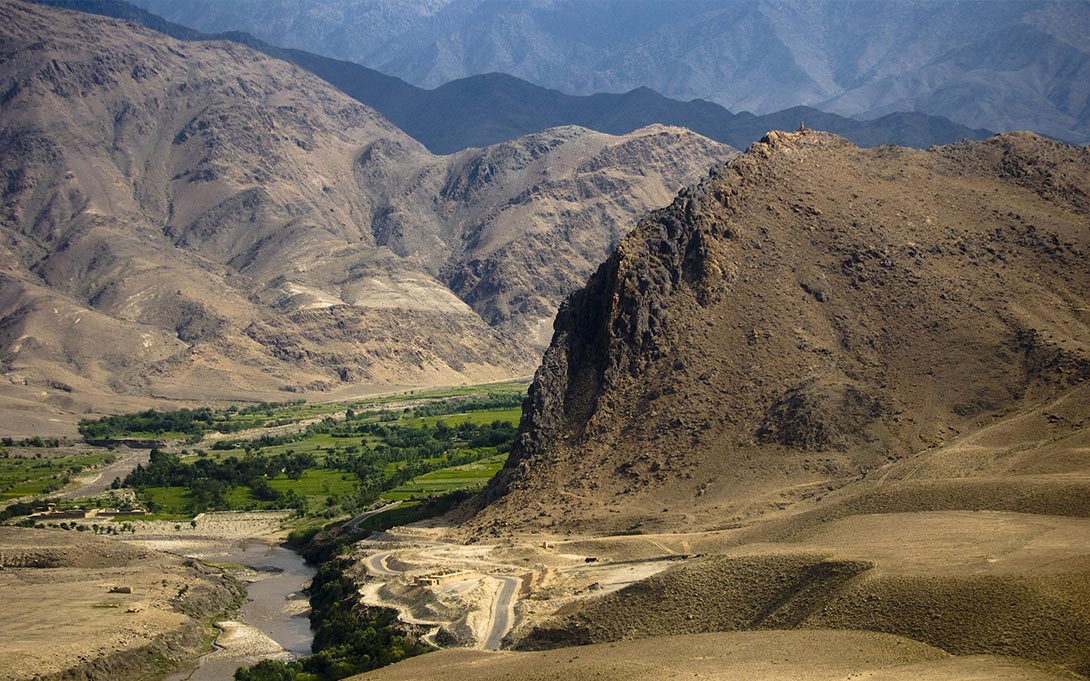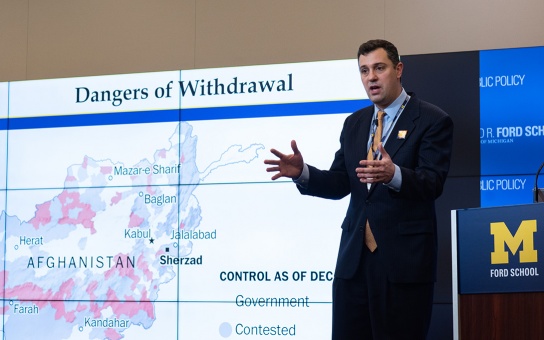
By Rebecca Cohen (MPP '09)
Thousands of Afghans holding pro-democracy values—some with ties to the U-M community—were left behind in the wake of the U.S. withdrawal from Afghanistan. In August, Taliban forces rapidly took control and formed a new government. And now, in the midst of a mounting humanitarian crisis, American friends and former allies face new dangers and uncertainties.
John Ciorciari, director of the International Policy Center and Weiser Diplomacy Center, is keeping his eye on the rapidly changing situation in Afghanistan and the political and humanitarian response from around the world.
"The Taliban has pledged to govern differently than it did in the 1990s as it seeks to secure foreign aid, dampen domestic opposition, and consolidate its position in power," Ciorciari says. "However, the composition of its cabinet shows that Taliban hardliners are ascendant over the moderates who vied with them for power. They have sent girls above 6th grade home from school, refused to collaborate with U.S. forces against ISIS-K, attacked ethnic Hazaras, and begun a campaign persecuting Afghans they deem to have supported the infidels. As the Taliban solidify their position, there is little reason to expect that human rights conditions will improve."
The immediate future for Afghans remains grim. International NGOs and UN agencies report food shortages and a breakdown in basic healthcare services, exacerbated by conflict, drought, and the COVID-19 pandemic. The country has been cut off from the global banking system, the main pathway for sending nearly 789 million USD into the country from Afghans living abroad in 2020.
International and domestic agencies brace for further mass exodus of Afghan refugees, creating even more pressure for surrounding countries, which already host millions of refugees.

Describing the rapidly changing situation in the region, Ciorciari says, "The Pakistani government is concerned about mass migration and taking a hard line. They are closing key border crossings and deporting some arriving Afghan migrants. Tajikistan has sent troops to the border, fearful both of migration and of possible conflict involving armed Afghan rebel groups that recently fled across the Tajik border. Officials in Iran are worried as well and are pressing diplomatically for a more inclusive and moderate Taliban-led government in Kabul."
Ciorciari says that if Afghans are able to exit the country, the surge of refugees around the world would be comparable to the number of Vietnamese refugees in 1975. At a special summit in October, G20 leaders pledged to assist with the crisis. President Joe Biden significantly raised the number of refugees allowed into the U.S. to 125,000, and appointed veteran diplomat Elizabeth Jones to coordinate Afghan relocation efforts.
"There is support on both sides of the aisle to help Afghans at risk," Ciorciari says. "However, the U.S. refugee resettlement system is not prepared to handle such an influx, in part due to its winnowing during the Trump presidency. The Biden administration has raised the refugee cap and will allow for private sponsorship of Afghan refugees, which are welcome steps, but much more urgently needs to be done. In particular, the administration has to work with foreign partners to help vulnerable Afghans still inside Afghanistan secure visas and travel to places where they can be interviewed by U.S. officials. This is the imperative unfinished business of a poorly executed withdrawal and evacuation."
Helping hands
A number of national organizations administer services to refugee populations.
- The Lutheran Immigration and Refugee Service is seeking volunteers to help refugees with airport transportation, housing, and meals, and is also accepting donations online.
- The International Rescue Committee is accepting monetary donations online.
- Human Rights First is accepting donations to help provide pro-bono legal assistance to Afghan evacuees to safely leave and protect their identities from the Taliban.
- The International Refugee Assistance Project is accepting donations to help provide legal services to incoming Afghan refugees.
- HIAS provides volunteer information, government resources, and advocacy guidance. It has several local resettlement partners that offer volunteer opportunities.
Many states offer refugee resettlement programs that work with local agencies to provide direct assistance and placement. Opportunities may be found through a web search on these state programs. U-M students have also been taking action. This fall, several conducted research to support an Afghan asylum applicant, and they are now mobilizing to advocate for policies to promote stronger access and protection for Afghan refugees.
"Student actions reflect the values—community, integrity, respect, service, inclusion, diversity, and equity—that we talk about at the Ford School," Ciorciari says. "I couldn’t be more proud of our students for engaging in these critical and impactful issues."
Policy Talks @ the Ford School
Watch: Distinguished journalists Robin Wright and Jawad Sukhanyar discuss the evolving situation in Afghanistan, the challenges faced by refugees, and America’s place in the world after its withdrawal from Afghanistan. Co-sponsored by the Ford School, Wallace House, and Donia Human Rights Center.
More in State & Hill
Below, find the full, formatted fall 2021 edition of State & Hill. Click here to return to the fall 2021 State & Hill homepage.
